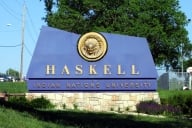You have /5 articles left.
Sign up for a free account or log in.
Colleges rely on high schools to produce students who can do college-level work. But, according to a study released today, college professors and high-school educators don't necessarily see eye-to-eye on what the curriculum for college-prepared students should be.
The ACT's National Curriculum Survey for 2005-2006 -- given to secondary-school teachers, college educators, and remedial instructors -- highlights a "misalignment" gap that has persisted for the 30 years it's been given, said Cynthia B. Schmeiser, president and chief operating officer of the ACT's education division. "We haven't seen it really getting any bigger, nor have we seen it getting any smaller," Schmeiser said, but she noted that conversation on the topic was increasing. "I think we're in the right time and the right place for [using] this information."
For most subject areas, the mismatch can be seen as one of a few essential concepts versus advanced content. According to the report, "High school teachers in all content areas (English/writing, reading, mathematics, and science) tended to rate far more content and skills as 'important' or 'very important' than did their postsecondary or remedial counterparts."
In math, for example, college instructors preferred an understanding of the fundamentals to a focus on higher-level study, while high-school teachers placed greater emphasis on the latter, such as statistics and graphical representations -- often, colleges fear, to the detriment of the basics. In the sciences, college educators believe an understanding of the scientific process and investigative methods is more important than knowledge of specific content areas -- again, the opposite of teachers' focus in high school.
In English, the survey suggests, high school instructors' focus on the development of students' ideas overlooks basic grammatical and syntactic skills -- possibly leading to an increased need for remedial teaching at the college level. Reading had the least misalignment between secondary and first-year college instructors, but the survey suggests that the reading skills acquired at previous levels are not built upon in high school.
The ACT study evaluates efforts in a movement that some are dubbing "P-16." The survey applies mainly to the high-schoolers who do not, despite the popular conception, take loads of AP classes and pay for college counseling: in other words, most American students. But ACT emphasized that college isn't the only end goal. Bringing standards in line with what instructors in higher education value the most would also help students seeking to move directly into the work force, ACT officials said -- "college readiness" being shorthand, as well, for "work readiness." "The skill sets we're looking at aren't just for college," said Jon Erickson, vice president for educational services at ACT.
To work toward bridging the gap between secondary teachers' views of what is important and those of college instructors, the ACT report mentions several policy proposals. One concerns state standards. While the authors don't attempt to distinguish between the quality of teaching and the standards that teaching is based on (another potential gap), they do note that the majority of teachers are at least "moderately familiar" with their standards and that "they are the foundation for each state's curriculum and assessment efforts." Rather than increase the number of standards, then, ACT recommends "fewer and more targeted state standards" that pinpoint key areas in which college educators believe depth, rather than breadth, is important.
Other suggestions include core course requirements and consistent assessment of college readiness to gauge student progress. Officials of ACT, which produces one of the two main college entrance exams in the country, don't see a conflict of interest. "I suppose one could perceive that. The real issue is, what are the expectations and outcomes we want from secondary education," Erickson said. He also suggested that college readiness skills be tested in existing state examinations.
Other noteworthy findings in the report:
- Remedial instructors tend to side with postsecondary educators in their ratings of what is most important in both math and reading.
- Most high-school teachers, in contrast to college instructors, believe their state standards prepare students for higher education.
- College educators perceive no real decline in high-school students' level of preparedness, but secondary-school instructors think the situation has gotten worse over the years.








